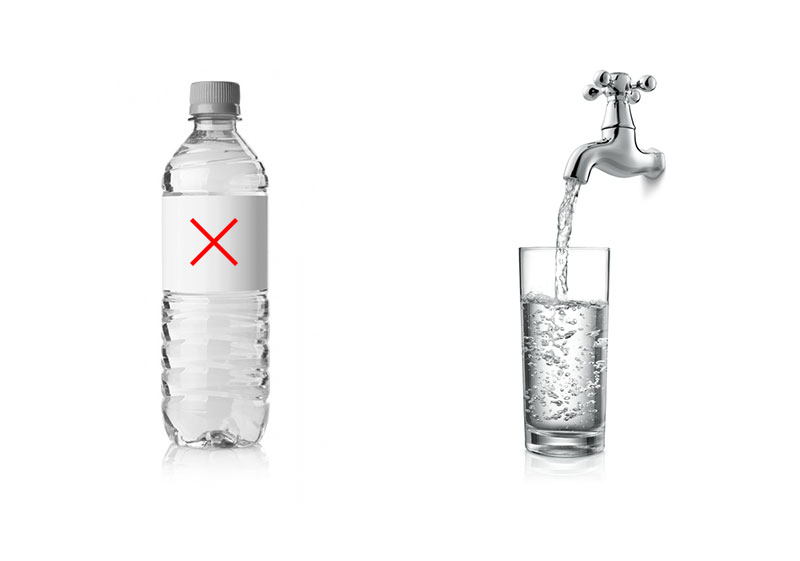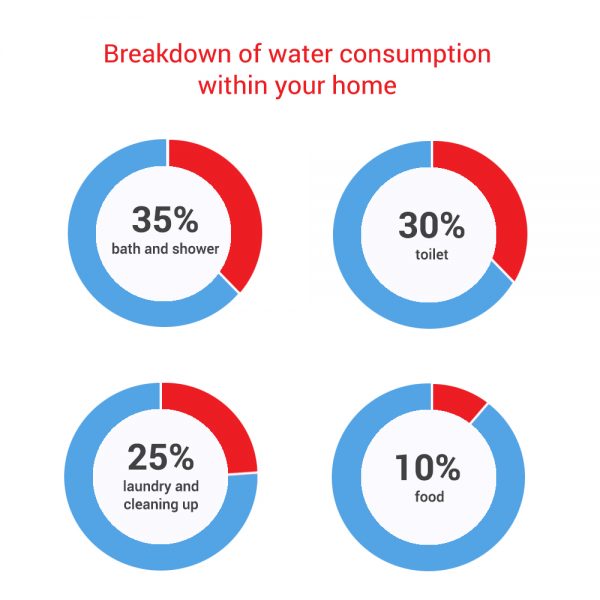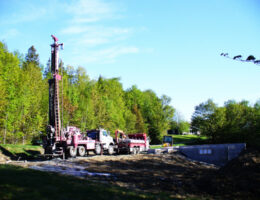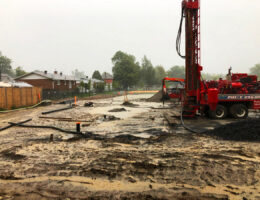Terrebonne Primary School
Forty-one 500 feet deep geothermal wells for the students and teachers at this Terrebonne elementary school, proudly carried out by the Puits Bernier team.
Montreal
Adding a geothermal well of 465 feet deep with a capacity of 3 tons to this residence of Montreal, Westmount. 2 days were needed to complete the work including drilling, development and horizontal.
Is bottled water really better than your well water?
 Sales of bottled water have not ceased to increase over the past few years. Quebeckers consume more than 250,000 half-liter bottles per day. We are very pleased to see that Quebeckers are drinking more water rather than other types of beverages, which, more often than not, are full of sugar and/or other components that can be harmful to health.
Sales of bottled water have not ceased to increase over the past few years. Quebeckers consume more than 250,000 half-liter bottles per day. We are very pleased to see that Quebeckers are drinking more water rather than other types of beverages, which, more often than not, are full of sugar and/or other components that can be harmful to health.
Nevertheless, this increase in the consumption of bottled water is without doubt due to the fact that water bottling companies spend fortunes annually on advertising, trying to convince you that their water is better, fresher and purer.
But on closer observation, one quickly realizes that it is not better and may even, in some cases, be unhealthy both for human health and for the environment.
Better or not?
As most water bottling companies take their water directly from municipal water supply systems, it is clear that it is basically no better than the water that flows directly from the faucet of your kitchen, costing a fraction of the price. There may even be more bacteria in these bottles of water due to transportation and storage, where the bottles are sometimes subjected to high temperatures.
Some plastic water bottles are manufactured with polyethylene terephthalate (P.E.T.). P.E.T. contains diphenol A, a chemical compound that should be controlled. This product can gradually dilute in bottled water and has a tendency to increase in concentration when the bottle is reused. It is proven that this product is harmful to health, notably by increasing the risk of cancer and miscarriages.
Moreover, from the environmental point of view, the consumption of bottled water has a far greater ecological footprint than your tap water. The manufacture of the bottle and its transport are two of the main environmental impacts. All the more so because in the end the bottle is rarely recycled, and even if it is recycled, the recycling process itself (transport of raw materials, energy for the transformation, etc.) causes a considerable increase of the ecological footprint.
A few figures
- You can pay up to 10,000 times more for bottled water
- 10% to 15% of the cost of each bottle is used for advertising by the water bottling companies
- One person out of five only uses bottled water to satisfy their daily needs for hydration
- Between 25% and 40% of all bottled water is simply filtered tap water
- In Quebec, barely 1 bottle out of 9 is recycled
A few solutions
It is quite easy to develop good habits in order to stop the consumption of bottled water. First, get a good reusable bottle that you can always fill from the faucet when necessary. It will cost you less than all the bottled water that you will avoid buying.
Of course, plan ahead to bring your reusable water bottle when you leave home. If you forget it, prefer local bottled water in order to reduce the energy expenditure related to the transportation of your purchase.
On a larger scale, you can request the installation of drinking fountains in public places or a ban on the sale of bottled water, as some cities are doing with plastic bags.
Simple gestures like drinking the water from your well or the public water system will have a positive impact for the future of the environment and the quality of life for your children and great-grandchildren.

Sources :
http://www.lapresse.ca/le-soleil/opinions/points-de-vue/201103/21/01-4381561-impact-de-leau-embouteillee-sur-lenvironnement-et-la-sante.php
http://www.lapresse.ca/vivre/sante/200810/15/01-29538-leau-embouteillee-nest-pas-plus-pure-que-leau-du-robinet.php
http://vieenvert.telequebec.tv/sujets/400/eau-embouteillee
Water consumption in Quebec
Québécois are big water consumers. With an average of 424 liters of water a day, we consume some 20% more than the Canadian average and twice as much as the Europeans do.

Unfortunately, a huge quantity of this water is being wasted. If you want to know more about how to reduce your daily water consumption at home and thus consume our drinking water, check out this article.
Source : Environnement Canada
Outaouais
One geothermic drill for the residence in Notre-Dame-de-la-Paix Outaouais, which will now save on heating and cooling costs.
Rénovert, the new tax credit
Quebec has introduced a new, temporary tax credit to which you may be entitled (in the production of your tax return) if you live in Quebec as of December 31st, 2016. The Rénovert tax credit is set up for the implementation of eco-responsible renovation works admitted in respect of an eligible dwelling that you may own or co-own. You may also qualify for this tax credit for 2017 if you live in Quebec as of December 31st, 2017.
Conditions
In order to benefit from this tax credit, you should, among other things, get your work qualified by a certified contractor, in compliance with an agreement set up after March 17th, 2016 and before April 1st, 2017, the eco-responsible renovation works admitted for your principal residence, or your habitable cottage you normally live in during the year.
Obviously, several conditions must be filled out in order to benefit from this tax credit. You will find these conditions on the website of Revenu Québec.
Admitted works
Not all the renovation works can qualify for this tax credit. Here is the list of eco-responsible renovation works admitted.
- Work on the shell of the house
- Roof insulation, exterior walls, exposed foundations and floors
- Sealing
- Installation of doors and windows
- Installation of a green roof or of a white roof
- Works on the mechanical systems of the house
- Heating system
- Air-conditioning system
- Water-heater system
- Ventilation systems
- Conservation and Quality of Water
- Soil quality
- Other renewable energy devices
For full details on each one of them, visit Revenu Québec.
Puits Bernier, a qualified contractor
By having your work done by Puits Bernier’s team, you will qualify for the new tax credit. Please, let us know if you have any further questions. You can also visit the website of Revenu Québec anytime in order to get any additional information.

Puits Bernier will be taking part in 2 exhibitions in 2016
During 2016, Puits Bernier will be present at 2 exhibitions, showcasing the products and services that highlight the expertise offered by our specialist team.
Expo Habitat Estrie – February 11 to 14, 2016
A exhibition that needs no introduction to residents of the region! Puits Bernier will be exhibiting at the 34th edition of the ever-popular Salon Expo Habitat Estrie, to be held at the Centre de Foires in Sherbrooke. A wide range of specialist building professionals will be on hand to explain the products and services on offer, as well as presenting our newest features. Pay us a visit at Stand #404.
Expo Habitat Quebec – February 17 to 21, 2016
The Puits Bernier team will round off its exhibition season at the Expo Habitat de Quebec, to be once again held at the Centre de Foires d’ExpoCité in Quebec. It will be the perfect opportunity to visit an exhibition where 300 exhibitors will be present under the same roof. Come and visit us at Stand #16 to discuss your future projects with our team.
We look forward to meeting and advising you on all aspects of the drilling industry.
Rules to respect when installing a well
Because there are a lot of rules and regulations to follow, it is absolutely necessary for the drilling of your artesian well to be done by a reputable company. The regulations on water catchment from the Ministry of Environment of Quebec is a guide to the process. Our team is trained, accredited and up to date on the latest standards in order to carry out your project according to the rules of the trade.
Here are a few points to note.
The location
Unfortunately you cannot drill your well just any where you choose to on your property. There are some distances to respect in order to not contaminate your water. here are some of them:
- 15 meters from a septic tank
- 30 meters from a drainage field
- 30 meters from a cultivated field
For farmland and farmhouses:
- 30 meters from a manure spread
- 300 meters from a manure storage
- 30 meters from a stable
- 75 meters from a cattle breeding stall
The sealing
In the event that your well is installed nearer than the distances indicated, a bentonite sealant will then be required. This step should be accomplished by a professional in order to prevent any infiltration into your well and to thereby maintain the good quality of your water. The sealing is successful, if among others:
- It has been sealed to a minimum depth of 5 meters
- There should be a minimum of 5cm of bentonite injected around the well’s steel casing
Disinfection
Once the work has been completed, you are obliged to disinfect your well in a manner to destroy all potential contamination that might have occurred during the construction. Follow the instructions in this article.
Maintenance
Once your well has been drilled, all you have to do is preserve the good quality of your water by doing a few checks from time to time:
- Check that there are no animals and dead leaves near your well
- Check that there is no stagnant water in proximity to your well
- Keep the cover closed
- Check that there are no cracks in the tube which could allow surface water or residues to seep into your well
- Avoid treating the land near your well with fertilizer or pesticides
- Abstain from disposing of chemical products such as oil, solvents, paint, etc. in the toilets
Testing
You are no longer obliged by law to have your water tested by a laboratory accredited by the Ministry of Environment after drilling a well. But for precautionary measures, we strongly advise you to do this test which will assure you of the good quality of your water.
If the rules are not followed during the drilling of your well, you will find yourself with a well that does not conform to the standards required by law. This could have a negative impact at the sale of your house or even worse, on your health.
You will find all the necessary information in this document.

St-Adèle
3 geothermic drills for the residence in St-Adèle, which will now save on heating and cooling costs.
Rimouski
2 geothermic drills measuring 500 feet deep for the home in Rimouski.




